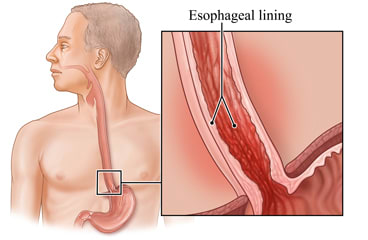
Overview
Esophagitis (say "ee-sof-uh-JY-tus") is irritation or inflammation in the esophagus. This is the tube that carries food from your throat to your stomach. In eosinophilic (say "ee-uh-sin-uh-FILL-ick") esophagitis, white blood cells called eosinophils are found where the esophagus is irritated or inflamed.
These white blood cells are part of the immune system. The body sends them out in response to an allergic reaction. This has led experts to think that allergies-especially food allergies-may cause this condition. People who have it will often have other types of allergic reactions too, like hay fever, eczema, or asthma.
The condition can occur in both children and adults. It's more common in males than in females. It may run in families.
Symptoms in adults include trouble swallowing, pain in the chest or upper belly, and heartburn. Children who have the condition may refuse to eat and may not gain weight. They may have nausea, vomiting, or belly pain.
Medicines are also used to reduce acid reflux and inflammation. The most common ones are:
- Proton pump inhibitors (for adults).
-
These medicines reduce acid reflux, so they may help relieve irritation.
- Corticosteroids.
-
They can reduce inflammation. Some people need to take them long-term to keep their symptoms under control.
Changing your diet may also help to treat the condition. If you have been tested and know your food allergens, you can just avoid those foods. If not, your doctor may suggest a special diet.
Follow-up care is a key part of your treatment and safety. Be sure to make and go to all appointments, and call your doctor if you are having problems. It's also a good idea to know your test results and keep a list of the medicines you take.
How can you care for yourself at home?
- Work with a dietitian if you need a special diet. They can help make sure that you get the nutrients you need to be healthy.
- Talk to your doctor about managing allergies.
- Be safe with medicines. Take your medicines exactly as prescribed. Call your doctor if you think you are having a problem with your medicine.
When should you call for help?
Call 911 anytime you think you may need emergency care. For example, call if:
- Food or something sharp is stuck in your esophagus and you can't swallow at all.
Call your doctor now or seek immediate medical care if:
- You have new or worse belly pain.
- You are vomiting.
Watch closely for changes in your health, and be sure to contact your doctor if:
- You have new or worse symptoms of reflux.
- You have any pain or trouble swallowing.
- You are losing weight.
- You do not get better as expected.
Where can you learn more?
Go to http://www.healthwise.net/patientEd
Enter W611 in the search box to learn more about "Eosinophilic Esophagitis: Care Instructions".
Current as of: October 19, 2024
Author: Ignite Healthwise, LLC Staff
Clinical Review Board
All Ignite Healthwise, LLC education is reviewed by a team that includes physicians, nurses, advanced practitioners, registered dieticians, and other healthcare professionals.

